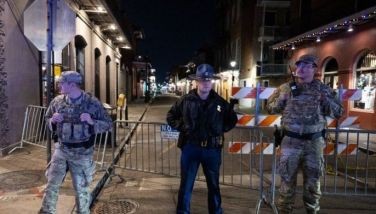Young and alone: Europe sees record surge of child refugees
KENT — The bags are packed, the goodbye hugs done. The Afghan, Eritrean and Sudanese boys are on the move again, but this time it's a happy occasion: After months of hardship traversing continents, the teenage refugees are finally on the way to English homes where they can settle down for a long dreamed-of life in Europe.
The dozens of boys are unaccompanied child refugees who have come to the end of a long, risky journey by boat, foot, truck and train. Upon reaching the shores of Dover they were brought to a reception center in Kent, southern England, where they were given temporary shelter. As the teenagers leave for more permanent social housing or foster homes, they are seen off by another group of boys who are eagerly awaiting their turn.
Europe's migrant crisis has seen a record surge of unaccompanied child asylum seekers fleeing civil war, conscription and poverty at home to countries including Britain and Sweden, which have scrambled to provide care for thousands of newly arrived minors. Most are boys aged between 14 to 18 hailing from Syria, Afghanistan, Eritrea and Sudan.
"I'm happy to leave today," said Sadiq, a shy 17-year-old Sudanese, who said he wanted to become an engineer. Like all the refugees interviewed at the center, his full name cannot be reported because they are minors under government care.
Like the other youngsters, Sadiq had made it to Europe alone after leaving behind his family, and may never see his loved ones again. He lowered his head when asked about his homeland, where a years-long conflict has killed thousands and driven millions from their homes.
"Since I left I have had no information, I don't know anything about my family. I'm very sad because of that, but what can I do?"
In Kent, the main English county receiving the children, arrivals jumped from 296 in September 2014 to almost 800 in the same period this year. Almost all land in Dover, a key port connected by rail and road to France. And in Sweden, which takes the largest number of refugees per capita in Europe, the Migration Agency says almost 1,300 minors sought asylum in a single week in September — a staggering increase from about 400 a week in June. The agency estimates that a total of 12,000 unaccompanied children would have sought asylum in the country this year.
"The municipalities have never been close to having a situation like this before, ever," said Kjell-Terje Torvik, an expert at the Swedish migration board who has worked with child refugees for over a decade. "Even though we knew the numbers were going to rise, this is far beyond our imagination."
Social workers say many child refugees have to take off alone because of desperate circumstances: Some became separated from their families in war; others are alone because their family cannot afford to send more than one member abroad. Younger refugees also often have better chances of getting asylum in Europe.
Compared to adult asylum seekers, unaccompanied children are treated under a different set of rules in many European countries. Because they are more vulnerable, they are separated from other migrants and refugees on arrival at their destination country, and transferred to local reception centers like the one in Kent. There they stay for up for two months while authorities make further plans for them: Some will transfer to social housing with supervision by social workers or a guardian — a "god man" in Swedish, meaning a "good person" — while others stay with local foster families. All have the right to accommodation and welfare benefits including education, health care, and money to buy food and clothes.
At the Kent reception center, which has been overflowing with young refugees since the summer, facilities are clean and resemble those at a student hostel. Newcomers are given a welcome pack of toiletries, pajamas, a copy of the Quran or a Bible. The rooms are small, but each is fitted with bunk beds, a sink and a mirror in the corner. The scene is remarkable in its ordinariness: A big group of boys is playing games and watching a teen music TV show in the lounge, while others are relaxing and chatting in the courtyard.
"They go out to familiarize themselves with English life — they play football, go to the shops," said Sue Clifton, county manager overseeing the center. "They learn about the expectations of living in England."
It's a huge change of circumstances for the teenagers, many of whom had crossed the Mediterranean squeezed onto small boats with hundreds of other migrants. Some had seen their families killed. One said he hung on under a truck from France for 10 hours before finally reaching Dover. Another was held at gunpoint in Libya.
Still others endure worse during their trip. Lacking money for the whole journey, some are forced into prostitution, or try to earn enough by working in factories in Turkey or Iran, said Torvik. A journey from Afghanistan to Sweden could take months, sometimes years, he said.
"They have been showing tremendous strength," he said. "Even though they have been witnessing very hard things in their home country, the separation from their family is a trauma in itself. Sometimes (officials) encounter children crying out of control in the night ... it's a very hard situation in a foreign country, not knowing the language, without their families."
Authorities in Britain and Sweden say their resources have been strained hiring extra staff and trying to find new homes for the influx, which has not shown signs of slowing. Over the summer, Kent officials have had to put some children in taxis to other counties to find a suitable foster home because there was simply nowhere to house them. Officials estimate that each child refugee costs the county 30,000 pounds ($45,500) a year.
In Malmo, the Swedish city receiving the bulk of the country's child refugees, social services have opened five new reception centers and hired some 70 extra staff to cope since August. Annelie Larsson, who heads the city's social services, said it receives an average of 80 children every day, with most arriving by bus, train or car from neighboring Denmark.
Most are unlikely to reunite with their families, she said.
Larsson and Torvik agree that Sweden, with its strong tradition for solidarity and children's rights, will continue to attract scores of refugees — and will keep on accommodating them. And in Kent, officials are also trying their best to secure more central government funding for their work.
For the children, that's a ticket to a dramatically improved future.
"I want to continue my education here — back home I couldn't go to school. I miss (my family), but no, I wouldn't want to go back," said Simon, 16, who left his parents and seven siblings in Eritrea. Is Europe a dream come true? "I don't know. I'll wait to find out what the reality is."
- Latest
- Trending
































